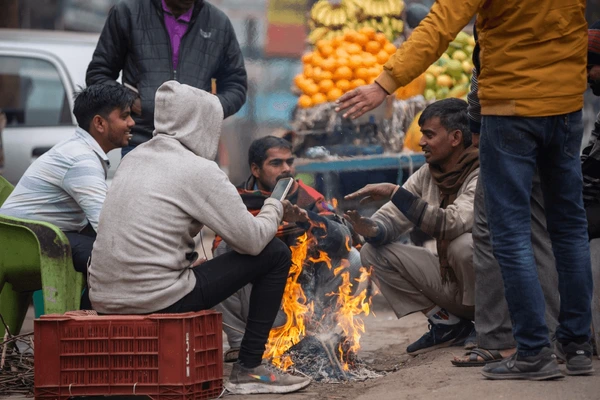Delhi, the capital city of India, woke up to the coldest morning of the winter season on Monday, with the minimum temperature plummeting to 3.5°C. The biting cold was accompanied by a thick layer of fog that enveloped several parts of the city, leading to visibility issues and disruptions in various sectors, including transportation.
The India Meteorological Department (IMD) has issued an orange alert for a cold wave on Monday and Tuesday. The city is expected to witness mainly clear skies with dense to very dense fog during the morning hours. These conditions are likely to persist until January 20, impacting normal life and posing challenges for commuters.
Over the past three days, the minimum temperature in Delhi has been hovering around 3 to 4 degrees Celsius. On January 14, it recorded the lowest at 3.5°C, while on Saturday, it was 3.6 degrees Celsius, and on Friday, it stood at 3.9 degrees Celsius. These frigid temperatures are significantly below the seasonal average.
The severe fog conditions have disrupted flight operations at the Indira Gandhi International Airport in Delhi. The airport authorities issued an advisory urging passengers to check with their respective airlines for updated flight information. Numerous flights were delayed by hours, impacting travel plans for many passengers. The dense fog created low visibility, making it challenging for pilots to operate flights safely.
Several airlines, including IndiGo, faced operational challenges due to the low visibility and dense fog conditions. In a statement, IndiGo apologized for the inconvenience caused to passengers and mentioned that the flight operations were impacted on January 14. The airline’s staff worked to keep passengers informed about delays and cancellations throughout the day.
The Indian Railways also reported delays in train services due to the prevailing fog conditions. Around 22 Delhi-bound trains experienced delays ranging from one to six hours. The reduced visibility and challenging weather conditions posed logistical challenges for both air and rail travel, affecting the schedules of various modes of transportation.
The overall Air Quality Index (AQI) in Delhi stood at 398, categorized as ‘very poor,’ according to the Central Pollution Control Board (CPCB) data. The city’s air quality has been a cause for concern, and the authorities reimposed restrictions under Stage III of the Graded Response Action Plan (GRAP) in the National Capital Region (NCR) on January 14.
As a response to the deteriorating air quality, the Delhi transport department implemented restrictions, including a ban on construction activities and the operation of BS-III petrol and BS-IV diesel four-wheelers in the city. These measures were enforced to curb pollution levels and protect public health.
Despite the challenges posed by the weather conditions, the Delhi Education Department decided to reopen schools for all classes on January 15 in physical learning mode. However, schools were instructed to operate after 9 am and conclude classes by 5 pm. The decision to resume in-person classes amid the cold wave and fog was accompanied by precautions to ensure the safety and well-being of students.
Delhi continues to grapple with harsh winter conditions, marked by record-low temperatures which is at 3.5°C, dense fog, and disruptions in transportation. The impact on air and rail travel, coupled with concerns about air quality, underscores the challenges faced by residents and authorities during this winter season. As the city navigates through these weather challenges, residents are advised to exercise caution, and travelers are urged to stay updated on the latest information from airlines and transportation authorities.
